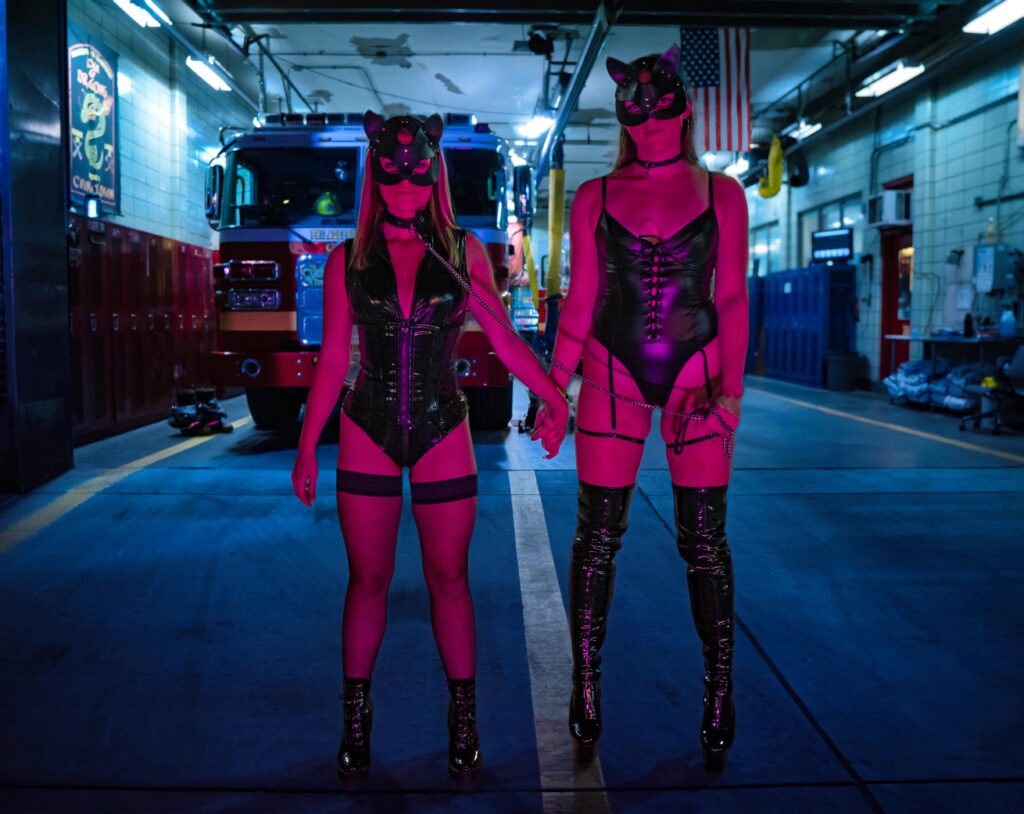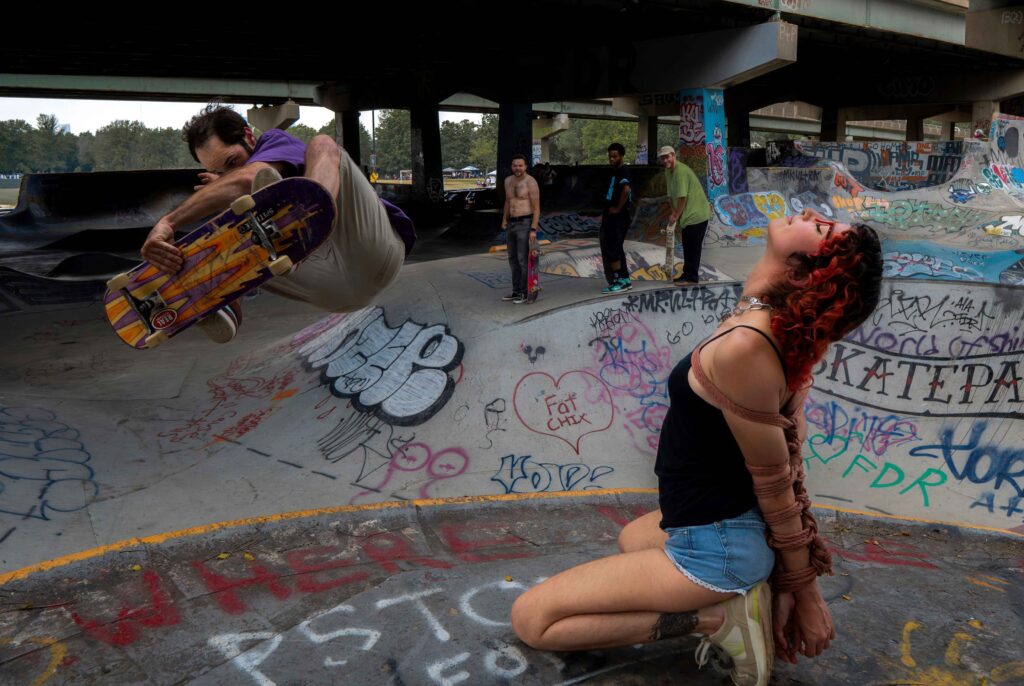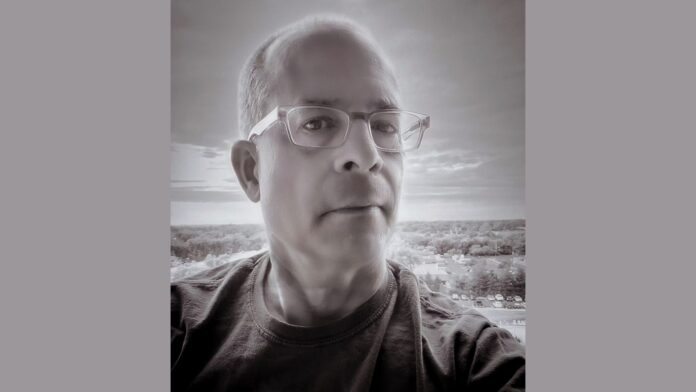“Kink is normal. Society just made it taboo because desire and instinct frighten people.” ― Adam A. Fox, “A Sinful Symphony”
These days, a number of factions of our community are under siege. Anti-drag show bills are popping up everywhere. Transphobia is continuing to rear its ugly head. And most recently, the kink community has been the target du jour. Just last month, a far-right social media group managed to get a $1 million funding request for the William Way LGBT Community Center pulled because the LGBTQ-focused nonprofit rented its space for a group that has previously hosted BDSM-kink parties. Fortunately, this week’s Portrait Greg Cohen has a different take on things and has set out to celebrate the alt-kink community here in Philadelphia through a series of photographs. Cohen’s work has been seen in The Village Voice, Huck and numerous other media outlets. We took a moment between shoots to talk about his art and mission. Some responses have been edited for length and clarity.
Where were you developed? See what I did with that photography reference?
Philly! I was born in the northeast. Then the folks moved to the suburbs, Lansdale, and then we moved to Texas. I went to college there as well, then moved to New York City and then back to Philly and got my Master of Fine Arts at Temple and have been here ever since.
What’s the family makeup?
I have a brother and a sister and they still live in Texas. My parents are still there too.
Were your folks also creative? What did they do?
Not particularly. I’m the odd man out. I discovered photography when I was young. My parents sent me to an overnight summer camp and one of the activities was a photography class. It was magical to me. I was a senior in high school when I started focusing on it as a serious pursuit. Though I should say that I don’t really do it as a profession currently, though I did do a recent gig for the Village Voice in NY. I photographed Comic Con for them. It was a paid gig but I wouldn’t consider myself a full-time professional. I have a day job in sales.
Did you shoot for the school newspaper and that sort of thing?
No. In Texas, I was zoned to go to the Robert E. Lee High School. It wasn’t a place I thought I’d fit in but luckily I was able to get into the high school of performing and visual arts. There was dance, music, arts — and I met all sorts of creative people. That’s when things started to blossom for me.
What was the biggest culture shock moving to Texas?
The Texans! [Laughing] Seriously! I’m a Jew from the Northeast and I remember a defining moment when I was a freshman in college. I was standing in line waiting to sign up for classes and the girl in front of me turned around. We were talking about something, and then she suddenly told me that she met her first Jew the other day. I was like, “That’s interesting. Tell me all about it.” It was pretty eye opening. I mean, not all of Texas is like that. Of course, you have places like Austin, etc. but as soon as I graduated, I moved back east. I lived in NY for a while before settling in Philly.
It’s funny, I’m Black, but most people can’t tell from looking at me, especially white people. In college, my roommate was Jewish, but was from down south and had a heavy southern accent, so no one imagined that she was Jewish and people would say the most outrageous things in front of us. It happened so often that we’d burst out laughing when someone said something and we’d jump in for each other, “You idiot, she’s Jewish!” or vice versa.
It’s almost like you were in deep cover! You got to hear things that people felt and then actually said out loud thinking it would be accepted, not knowing your background. I got that all the time in Texas too. And I know there were some towns in Texas, where if you were Black, you couldn’t drive through those towns. I mean, we’re not talking 1950s. I’m not that old, right? It’s still pretty sketchy in many areas. But I’m back in Philly now and have been here for a while.
And doing your photo thing here now.
Yes, photography has been more than a passion. It’s the way I explore the world. It’s an essential part of who I am.
How does the camera open up different worlds to you?
What I love to do is street photography. Whether it’s Pride or the Mummer’s or Chinese New Year, it’s a way of discovering people and communities that I might not ordinarily have met in a lot of cases. I never use a telephoto lens. I like to be up close to the people, or person, I’m photographing. I’m not asking permission or necessarily having a verbal exchange with them, but I’m right up in the thick of things and using a flash on camera, so it’s not like I’m being secretive. And even though I’m not in the picture, I’m part of it because they are aware that I’m there. In the past couple of years though, I’ve started doing more collaborative shoots, mostly with people in the alt-kink community. I’ll come up with a concept based on my conversations with people and what it is I’m trying to say or do and we’ll shoot it one on one where there’s an exchange between us. I try to be selective in who I pick so that there is always a connection and happily I’ve remained friends with a lot of the people I’ve done sessions with.
In your “About Me” on your webpage, you write that you’re interested in different groups and subcultures that are considered “alternative.”
I think I’ve never consciously sought out people from ‘subcultures’ but when I look back at the photography I did, starting in NY, I guess I did. I think I’m interested in people who are living their lives not conforming to what society expects of them, but what they expect and want for themselves. I suppose I’ve always been attracted to that.
Is there any one person you’ve worked with who stands out in your mind?
Back in the ’80s when I lived in the East Village, I remember walking into an art gallery and I saw these dolls that were absolutely incredible and slightly disturbing. There was a portrait of the person who made them. She was beautiful and her name was Greer Lankton. She’d had a sex-change operation and was one of the early pioneers in that community. She became quite famous, and I believe there’s a museum named after her that’s based on her work. But anyway, I called her, because in those days you could track someone down or look in the phone book to find people and I asked if I could take her portrait. She invited me to her apartment and I did this beautiful black-and- white infrared photograph and it was incredible. I didn’t know until years later how much influence she had and that she was the muse for a very famous photographer who I really admired. But for me, it wasn’t just her beauty. It was the way she lived her life. She was dirt poor, but she lived her life the way she wanted to. I found the whole experience very inspiring.
Your work has taken you to some interesting places, including a Trump rally! Tell me about where the work has taken you physically.
You know, I’ve gained a bit of a reputation — positive — especially in the alt-kink community, which is great because trust is very important, as is consent. Though I’ve done work in private spaces, because not everyone is comfortable being that exposed. I prefer shooting in public spaces. There’s something performative and perhaps exhibitionist about it even for me as I’m part of it. For example, recently, I photographed two women in Chinatown in front of the firehouse and as we were doing the shoot, crowds were gathering. No one was hostile, just curious and we all had a great time. I found that the people around us in a way became part of the process. To me, it’s an interesting dive into psychology. I’m fascinated by group behavior. Like when you get 5,000 Trump supporters waiting to get into a rally, the group behavior is mind-blowing.

Were you nervous at all?
No, but it was the most bizarre…it was disturbing. On one hand, there are grandmothers there, families with children, and it can look very normal. But underneath it, there’s some very hostile messaging, people wearing shirts that say, “F%#k your feelings” and very derogatory messages. But I never felt threatened. And there was a huge police presence there.
What are some of the misconceptions that you might have had about some of the communities you’ve covered?
I’ve always been very open minded. I’ve met a lot of different people through my creative endeavors and have been around all types of people expressing themselves in various and interesting ways. I’ve met a lot of creative people who I gain inspiration from. If I had one misconception, which was quickly dispelled, it was that people in the alt-kink community were just looking for sexual experiences. And while that might be somewhat the case, it’s far from being all that that community is about.
One of the eye-opening aspects is that there are people from all walks of life involved — Doctors and lawyers, students and machine mechanics — all in a community where they don’t have to worry about being judged or shamed. It kind of reminds me of something I observed on a trip to Fire Island. You have to take a ferry to get to the island, and on the trip over, I noticed two guys sitting next to each other. They looked like they were sitting on the subway, but as soon as the boat launched, you could feel the energy change. The closer we got to Fire Island, the more they relaxed and started acting like a couple, like lovers. I thought it was so beautiful that they had a place where they could feel free to be themselves.
The alt-kink community is the same. It’s sad that some people have to live these dualities because of the way society judges people. It must be difficult and frustrating, but at least there’s a strong community to go to for support.
What was your coming out journey?
My coming out journey?
Yup.
Well, I’m heterosexual! But I’ve always been an ally. I’ve been photographing Pride in various cities for years and of course a large portion of the alt-kink community is LGBTQ+. I don’t know the scene in places like Boston or Chicago, but I love that there’s such a vibrant queer community in Philly. And I’ve felt supported by the community as well.
For example, the Philadelphia Rubber Club meets at the Bike Stop once a month. I contacted the gentleman who runs it and for two months, I did portraits at the Bike Stop for anyone who wanted one and it was a great experience. Everyone was so welcoming. I think they saw that I wasn’t there to exploit anyone. I was there to celebrate something. And now we’re going to be going to Rittenhouse Square in the middle of the day and do a shoot. I already have seven volunteers who are going to participate! You know, part of my goal is to shine a positive light on a subject that people don’t know a lot about or think of as this secretive scary thing and bring it out in public. To generate conversation and hopefully open minds just a little.
Maybe we can even get that million dollar grant back! OK, let’s go for a few random questions. Favorite pair of shoes?
My Doc Martens.
Who would you call to get bailed out of jail?
My ex-wife. [Laughing] She might let me stew for a couple of hours because I was stupid enough to get arrested, but she’d get me out. We’re still friends.
What’s your favorite celebrity encounter?
The one that I tell my daughter— because it’s a lesson for her and for me — is from way back when I lived in NY. One of the hottest clubs in NY was called Area and at the time, I was the assistant for a very famous fashion photographer. Her boyfriend used to shoot in the club every night for Details magazine so anytime I wanted to go, he would put me on the guest list. There were people like Bianca Jagger, Grace Jones, Malcolm Forbes and Boy George there on any given night. One night, I was on the dance floor and standing just four feet away from me were Andy Warhol and Jean-Michel Basquiat! I was so intimidated that I didn’t say a word to either of them and to this day, I’m still regretting it. I mean, how many chances do you get to be in that position? Just one and I blew it!
Well, lesson learned. It seems like you’ve been opening up to people ever since.
For more information, visit gregoryscohen.com.


